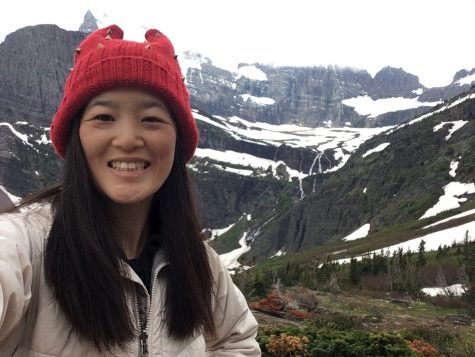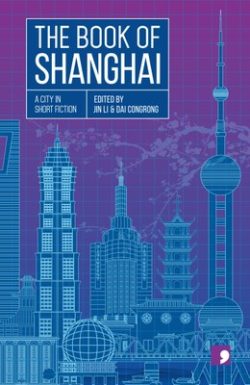Talking Translation: Katherine Tse

We're delighted to be joined by translator Katherine Tse for the latest in our 'Talking Translation' series. Katherine is one of our own alumni, who did an MA in Translation here at Leeds, and it's great to see one of her translations featured as part of The Book of Shanghai, just out from Comma Press as part of their 'Reading the City' series (which is also featured on our Book Club for May 2020). She has been a freelance Chinese-English translator since 2015, and you can find out more about her work on her website.
What got you started in translation?
I fell into it in 2015 when I was taking Chinese classes at Shida (National Taiwan Normal University) and one of the interpreting professors asked me to audit his classes and help his students out. I started going every Friday morning to learn consecutive interpreting and practice it in real-time with his students. Then he took me under his wing with translation and started giving me more translation jobs, which led me to my first agency. When I moved to China the next year, I was fortunate enough to be connected with more clients and have been freelancing ever since. Finishing my MA in Translation at the University of Leeds last year was also an incredible experience that has helped me improve as a translator.
You’ve worked or studied in mainland China, Taiwan, the UK, and the US. How have these experiences affected your understanding of language and culture, in terms of your translation work?
That neither language nor culture are a monolithic whole. It can be convenient to think that as a native (US) English speaker, other variations of English are just a matter of spelling and therefore easy to master, but that’s not the case at all. I struggled with UK terminology sometimes when I was living in Leeds, like having to remember that first floors in the UK start on what’s really the second floor or that “revising” for the midterms actually just means studying. Those are anecdotal examples, but I think it’s always worth realizing (and remembering) that language is dynamic and fluid, rather than some rigid entity wherever it’s spoken.
The same goes for Chinese. “Knowing” Chinese (however you want to define that) doesn’t immediately grant you an understanding of all the cultures and dialects and nuances of the countries that speak Chinese, nor does it make you the most appropriate voice for those individuals. Just because I once lived in China or Taiwan doesn’t mean I ‘know’ or ‘understand’ those places by any means. At the end of the day, my time abroad has made me aware that if anything, I know that I know less than I did when I first started learning Chinese.
 You translated the story ‘Transparency’, by Xiao Bai, for The Book of Shanghai, from Comma Press. Can you tell us a bit more about the story, and some of the rewards and challenges of translating it?
You translated the story ‘Transparency’, by Xiao Bai, for The Book of Shanghai, from Comma Press. Can you tell us a bit more about the story, and some of the rewards and challenges of translating it?
On the surface, ‘Transparency’ is the story of a private eye hired to watch a husband, who may or may not be cheating, and culminating with the truth they uncover. The relationship isn’t the way it looks to the private eye – or to the outside eye. Neither is the story, which turns into a careful examination of a relationship built on subterfuge and mutual necessity.
With translating any literature, one of the challenges for me is finding the narrator’s voice. It’s not just retelling the story in a different language but retelling it the way the narrator meant it, in their particular tone, style, and insinuations. But in ‘Transparency’, we know very little about the narrator’s gender, background, family life – anything that can inform the way they think of relationships, the lens through which they watch this couple. It was challenging but rewarding to grapple with the text in that way, to convey a distinct personality and the unspecified, unspoken details that round out a narrator.
Despite that, I loved the way this story humanised Shanghai. It reminded me of Humans of New York: that people aren’t just how they appear, how they dress, or any other measure of superficial appearances. They’re a mess of stories, decisions, and motivations that propelled them into the present. On the outside, the married couple sound like they’re on their way up: cars, tailored clothing, gym memberships, and all. But their relationship is almost transactional; they’re playing games with each other, parasitic to the point of exploiting even the private eye.
Are there any authors or projects that you’d like to work on, or any particular genres? (Or simply authors that you’d love to see in translation?!)
Chiu Ko Publishing (九歌出版社, Taiwan) releases an annual collection of the year’s best short stories, penned by local writers. I actually translated a story from their 2011 collection for my translation dissertation but would love to work with them more, as I personally tend to gravitate toward Taiwanese stories out of nostalgia for the time I spent there. I’m also not the fastest reader in Chinese, so short stories are a more accessible gateway for me to understanding a wider range of experiences across more genres.
I’m also a big fan of thrillers/mysteries and just started 13.67 by Chan Ho-Kei – I’m reading the Chinese version, but it was also translated into English by Jeremy Tiang as The Borrowed. I’m also slowly getting more into sci-fi, which has never been one of my biggest interests, especially after I tried to tackle Three-Body Problem, a Hugo Award-winning Chinese sci-fi novel. That was a little too dense for me, but recently reading Ted Chiang’s Exhalation and watching Wandering Earth has rekindled my interest.
Do you have any advice for others hoping to get into translation?
Twitter is surprisingly an amazing place to connect, and engage with new/experienced translators, publishers, authors, and resources, as well as getting the latest news or learning about opportunities. I’d recommend Translation Talk (@translationtalk). Each week a different translator/interpreter takes over the account with Q&As, conversations, experiences, and more.
Another resource is Corinne McKay (@corinnemckay), who offers an abundance of actionable advice. On her blog Training for Translators, she addresses questions like finding jobs, nudging clients, setting rates, and a range of other topics universal to both experienced and new translators. She has also written two books for beginner translators that are worth the read.
Once COVID allows, I would also recommend meeting translators in your area and building a closer community. I’m fortunate to have classmates from my MA Translation program who continue to be a source of support, but meet-ups, workshops, or even translation-related Twitter threads are also a good place to start!
Are you working on anything at the moment that you can tell us about?
I don’t have any major projects in the pipeline, although I still work with regular clients like Sixth Tone, who continue to provide insightful human interest stories on the ground in China. Otherwise it’ll just be me with my two books (13.67 and Chiu Ko’s 2019 collection of short stories) for the time being!
Thanks, Kat!
